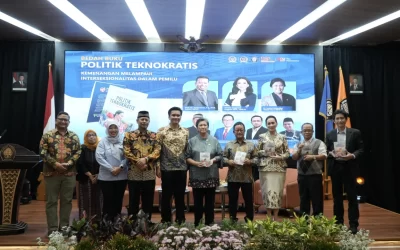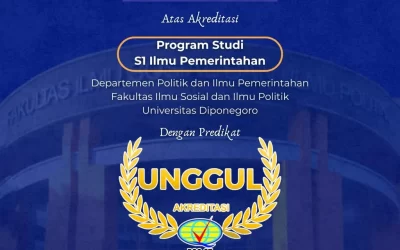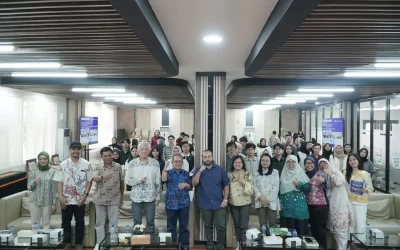Jakarta, August 24–25, 2025 – The Political Theory, Democracy, and Media Research Group (KBK) of the Faculty of Social and Political Sciences (FISIP) Diponegoro University (Undip), in collaboration with KITLV-Leiden University and LP3ES, held a book launch and review event entitled “Cyber ??Troops: Influence Operations and the Future of Indonesian Democracy” at the Aryaduta Menteng Hotel, Central Jakarta. The book was compiled by Mr. Wijayanto, S.I.P., M.Sc., Ph.D. from Diponegoro University, Prof. Ward Berenschot from KITLV-Leiden University, Prof. Yatun Sastramidjaja from the University of Amsterdam, and Dr. Kris Ruigjrok from KITLV-Leiden University. This event brought together academics, practitioners, media outlets, and democratic institutions to discuss the increasingly prevalent phenomenon of digital influence operations in Indonesia and the Southeast Asian region.
The two-day event opened with remarks from the Head of LP3ES, Mr. Rahmat Bagja, and remarks from the Vice Rector for Research, Innovation, Cooperation, and Public Communication at Diponegoro University, Mr. Wijayanto, S.I.P., M.Sc., Ph.D., the book’s author, and Prof. Ward Berenschot of KITLV-Leiden University. The keynote address by all three emphasized the importance of strengthening democracy in the digital age. The book “Pasukan Cyber” (Cyber ??Troops) is the result of in-depth collaborative research, examining how influence operations through social media, political buzzers, and disinformation can shape public opinion and even influence the direction of political policy. In the context of Indonesian democracy, these findings are crucial to understand because they directly relate to the quality of the democratic process, transparency, and national political legitimacy.
The panel discussion at the event featured several prominent figures, including the Chairman of Bawaslu, Rahmat Bagja; Member of the Indonesian General Elections Commission (KPU), Betty Idores; and the Rector of Paramadina University, Prof. Didik J. Rachbini, Kompas Editor-in-Chief Yogi Arif Nugraha, One Table Forum Leader Budiman Tanuredjo, Press Council Chairman Komaruddin Hidayat, and representatives from the Dutch Embassy. The speakers critically examined how “cyber troops” work in a structured and systematic manner to influence public discourse, while highlighting the challenges faced by the media, regulators, and civil society in maintaining the quality of democracy.
This event not only launched a book but also provided a forum for the exchange of ideas across sectors. Participants, including academics, media practitioners, students, and democracy activists, were given the opportunity to engage in direct dialogue through a question-and-answer session. The discussion was dynamic, touching on real-life examples of digital influence operations and solutions to minimize the negative impact of information manipulation in the digital space. Thus, this event successfully brought together diverse perspectives in formulating strategies to strengthen democracy in the digital age.
More than just an academic event, this book launch also demonstrates Undip’s commitment to contributing to the achievement of the Sustainable Development Goals (SDGs), particularly in the areas of quality education (SDG 4) and partnerships to achieve these goals (SDG 17). Through this activity, Undip expands its international research network, enhances its academic reputation, and demonstrates its consistency in mainstreaming the values ??of democracy, transparency, and sustainability. This also supports Undip’s vision of becoming a World-Class University, one that excels not only academically but also addresses global issues.
The book launch and review of “Pasukan Cyber” (Cyber ??Troops) examines in-depth Indonesian democracy, which faces serious challenges due to the development of digital technology. However, through collaboration between universities, research institutions, the media, regulators, and civil society, hope remains for maintaining the quality of democracy. The Faculty of Social and Political Sciences (FISIP) of Undip is committed to continuing to be a center for critical research and a platform for collaboration in addressing the nation’s strategic issues, so that Indonesian democracy can grow more healthily, adaptively, and sustainably amidst the currents of global digitalization.






0 Comments